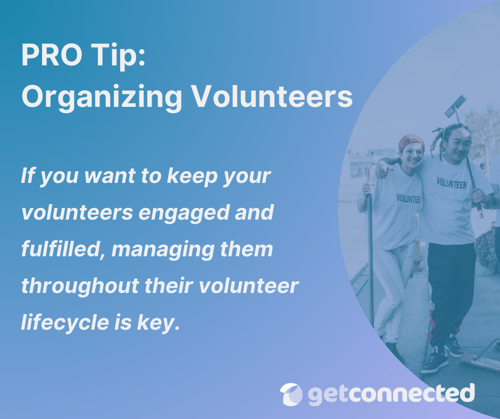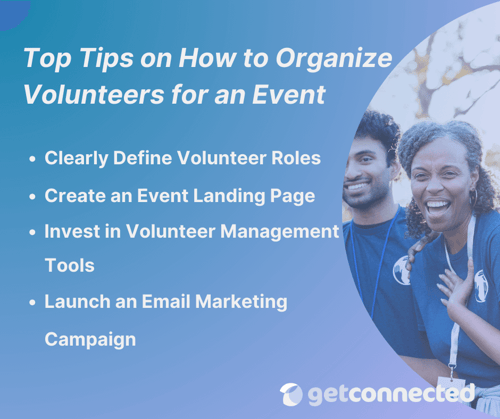Free events planning guide!
Eli Samuels
As a volunteer leader, you know that organizing volunteers for a successful event requires careful planning, coordination, and effective communication.
Whether you're hosting a community beach cleanup, a charity run, or a fundraising gala, the mobilization and collaboration of volunteers is essential. In this guide, we'll delve into the key steps and strategies for organizing volunteers to ensure your event is not only impactful but also stress free. By using these elements of volunteer organization, your event will leave a lasting impression on both the participants and the greater community.
Understanding the Volunteer Lifecycle
If you want to grow a pool of highly engaged and fulfilled event volunteers, it’s important to manage them throughout the volunteer lifecycle. 
What is the Volunteer Lifecycle?
The volunteer lifecycle is a conceptual framework that outlines the various stages a volunteer goes through from initial engagement to the end of their involvement with an organization or a specific project. While specific models may vary, a common representation includes the following key stages:
Volunteer Recruitment and Onboarding
- Volunteer Recruitment: Attracting potential volunteers through outreach, advertising, and networking.
- Volunteer Onboarding: Introducing volunteers to the organization, its mission, and providing essential training and orientation.
Orientation and Training
- Volunteer Orientation: Familiarizing volunteers with the organization's values, goals, and operational procedures.
- Volunteer Training: Equipping volunteers with the skills and knowledge necessary for their roles.
Active Service
- Volunteer Engagement: Volunteers actively participate in their assigned roles, contributing their time and skills.
- Supervision and Support: Providing ongoing guidance, feedback, and support to ensure volunteers feel valued and empowered.
Recognition and Appreciation
- Volunteer Appreciation: Recognizing and appreciating the efforts of volunteers through various means, such as awards, certificates, or public recognition.
- Volunteer Feedback: Regularly providing constructive feedback to reinforce positive contributions and address any concerns.
Transition and Exit
- Volunteer Evaluation: Assessing the volunteer's performance and impact on the organization.
- Transition Planning: Collaboratively planning for the volunteer's transition out of their current role or the organization.
Re-engagement or Departure
- Re-engagement: Providing opportunities for volunteers to take on new roles or continue their involvement in different capacities.
- Departure: Facilitating a smooth departure process, expressing gratitude, and maintaining a positive relationship with departing volunteers.
Understanding and effectively managing each stage of the volunteer lifecycle is crucial for organizations to maximize the impact of volunteer time, foster a positive volunteer experience, and smoothly orchestrate a volunteer event.
How to Manage and Organize Event Volunteers Throughout the Volunteer Lifecycle
Effectively managing event volunteers involves a strategic approach across the entire volunteer lifecycle. Here is some guidance for organizing volunteers through each stage:
Volunteer Matching
In order to assemble the most cohesive and impactful volunteer team, begin by assessing your volunteers’ skills, interests, and preferences. You can gather this information through volunteer surveys or through your organization’s volunteer management software.
Then, match volunteers with roles that are aligned with their capabilities, skills, and interests. Your organization might provide training opportunities aimed at developing volunteers’ skills, as well as a feedback system aimed at gauging volunteer satisfaction. This allows for an organized and impactful volunteer experience.
Volunteer Onboarding
During volunteer onboarding, it is essential to host welcome sessions, collect necessary documentation, and gather the necessary signatures and emergency contact information from your event volunteers. You must also equip your event volunteers with the necessary tools to carry out their volunteer roles, such as the proper materials, equipment, or uniforms.
Volunteer Preparation
In addition to volunteer matching and onboarding, preparation and scheduling are another essential aspect of effective event volunteer management.
Before the event, make sure you comprehensively prepare your volunteers. This includes conducting volunteer orientation sessions to familiarize volunteers with event details, your expectations, and their specific volunteer roles.
To optimize volunteer scheduling, create an organized system that clearly outlines volunteer shifts, breaks, and end times. A volunteer management software can help streamline volunteer scheduling and preparation tasks. Efficient volunteer preparation and scheduling contribute significantly to a smoother event execution, fostering a positive and well-coordinated volunteer experience. This approach not only enhances volunteer satisfaction but also ensures the seamless functioning of the overall event.
Day of Event
When the event is underway, volunteers will need to be supervised by a volunteer manager or by a senior volunteer team leader. Make sure to regularly check-in with volunteers to ensure that they know their roles and responsibilities. Establish a system for problem resolution, and have a contingency plan in place in case of no-shows or other unexpected events.
Top Tips on How to Organize Volunteers for an Event
As you embark on organizing both individual volunteers and volunteer teams, you have the opportunity to spark social change, build impact, and grow your program! But assembling and organizing event volunteers not only requires a strategic approach, but also a deeper understanding of the motivations of those who serve.
Let’s dig into some of these top tips for organizing volunteers so that you can mobilize your community and drive positive impact.
Clearly Define Volunteer Roles
Start by clearly defining the volunteer role and responsibility for each volunteer opportunity. By writing specific volunteer role descriptions or qualifications, you remove ambiguity from managing your volunteer event. You can even SEO-optimize this information by incorporating relevant keywords like “volunteer opportunities,” “volunteer team opportunities,” or “nonprofit events volunteers.”
For more information about writing irresistible volunteer opportunity descriptions, watch this recorded webinar.
Create an Event Landing Page
Design a dedicated landing page or section of your website that clearly communicates essential event information like location, time, and available volunteer opportunities. Ensure that the page has a clear call-to-action, is easily navigable, and is easy to find. Refer all of your volunteers and potential volunteers to this centralized page in order to easily disseminate information and stay organized.
Invest in Volunteer Management Tools
Volunteer management software will allow volunteer leaders to streamline volunteer organization and management, and positively impact the overall organization of your event.
Launch an Email Marketing Campaign
Create a list of your volunteers and send out email and newsletter notifications to keep them informed about your upcoming event. Make sure you use clear, concise language to communicate the important information about the event.
Organizing volunteers for a successful event goes beyond logistics and volunteer schedules. For a volunteer event to be successful, you’ll need a strategic approach, effective communication, and an eye towards managing volunteers throughout their lifecycle. By embracing effective communication, thoughtful planning, and continuous support, organizers can transform events into meaningful experiences for volunteers, leaving a positive impact on both the event itself and the individuals who generously contribute their time and energy.






